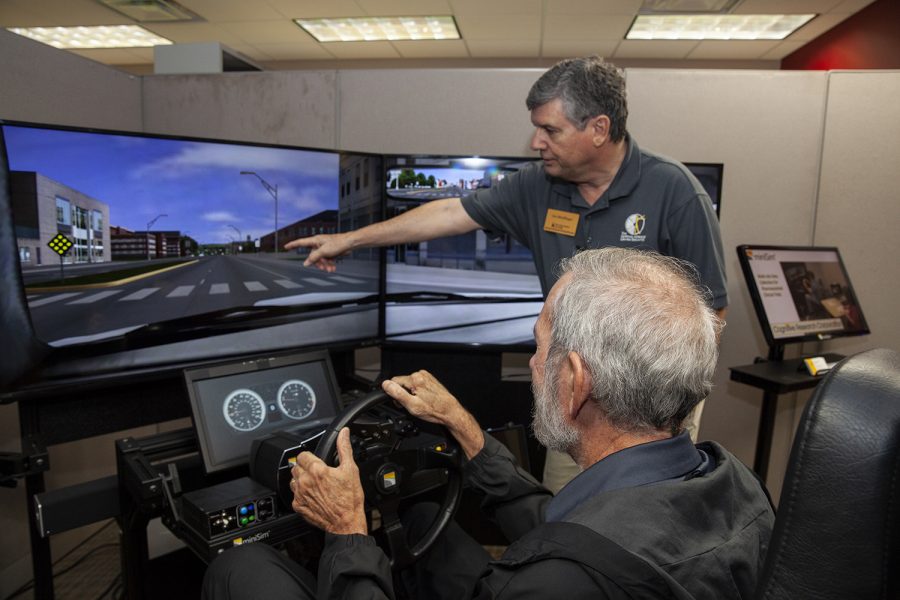University of Iowa researchers study effects of cannabis on driving
Researchers with the National Advanced Driving Simulator are offering participants $380 to use cannabis and drive in a simulator.
Joe Meidlinger instructs Tom Beaver of Iowa City on the use of a “mini sim” driving simulator during an open house at the National Advanced Driving Simulator in Coralville on Wednesday Oct. 10, 2018. Meidlinger is the program supervisor for the mini sim program. Beaver’s son, Greg, a UI senior and mechanical engineering student, works in the mini sim program.
September 2, 2020
The National Advanced Driving Simulator at the University of Iowa is conducting a paid study to test cannabis users to determine levels of impairment of those who use cannabis.
The data from this study will be used for the development of an app created by a California company, Advanced Brain Monitoring Inc., which allows users to test levels of impairment from cannabis.
Timothy Brown, director of drug driving research at the UI, said his research focuses on how different drugs will impact driving performances.
Brown said their research is important because there has not been a lot of research on the effects of cannabis on driving abilities. With alcohol, he said, it is clear that there is a correlation between the level of impairment and the amount of alcohol in the blood.
He added that there are also ways to test this level of impairment through blood-alcohol content tests, which is commonly used when drivers are pulled over if suspected to be operating a vehicle under the influence.
“The goal is to try and do the same sort of thing on the cannabis front,” Brown said. “We want to know when someone is impaired so we can differentiate somebody who used cannabis two days ago, but it might show up on their system, versus somebody who used it an hour ago and is not safe to drive.”
While subjects are driving in the simulator, researchers can test a number of physiologic responses through the use of electroencephalography and electrocardiography, according to Gary Milavetz, UI Executive Associate Dean in the College of Pharmacy and a professor in the Division of Applied Clinical Sciences.
Milavetz said some of these physiologic responses include blood pressure, heart rate, and where the eyes are focused. Researchers are also able to measure the subject’s reaction times while either braking or accelerating, he said. While the tests are running, researchers will be observing the brain’s activity to see subjects’ reactions to different stimuli in the tests.
Brown said that subjects will be given three different doses of THC at different times, with one of these times being a placebo dosage. They will test the subjects without THC, as well, to see how their normal driving abilities compare to when they are under the influence, he said.
Even though cannabis is not legal for recreational use in Iowa, Milavetz said the researchers were able to do the study with federal approval.
Researchers will use cannabis provided by the federal government researchers through a license obtained by Gary Gaffney, Emeritus Associate Professor of Psychiatry, who is also involved with the research.
Gaffney said federal regulations are very strict and meticulous when it comes to anything involving cannabis.
He also noted that individual people respond differently to drugs. This can be because of genetic differences, the way users metabolize drugs, and the way they perceive reality.
Gaffney said there are also so many differences in what kinds of drugs are available. Even in a controlled environment such as these tests, there will be varying effects on participants.
“The brain is a very complex organ,” Milavetz said. “The drugs change how you respond and how quickly you respond and how you perceive things.”
The data collected from this study will be used towards the development of an app called the Cannabis Impairment Detection Application.
Chris Berka, CEO and co-founder of Advanced Brain Monitoring Inc., which made the app, said it will be used to test the level of impairment by running through a list of cognitive tasks, such as picture memory tests. A headset that monitors the brain’s electrical outputs along with the user’s heart rate will also be used.
“We don’t have a good scientific basis for how much [cannabis] you can use and still safely get behind the wheel,” Berka said. “I think we have put ourselves at risk by not letting science catch up with the mass legalization.”







